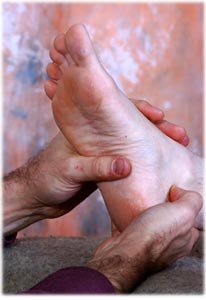What Does the Research Say about Reflexology?

 Research studies in the U.S. and around the world indicate possible benefits of reflexology, particularly in reducing pain, enhancing relaxation, and reducing psychological symptoms, such as anxiety and depression.
Research studies in the U.S. and around the world indicate possible benefits of reflexology, particularly in reducing pain, enhancing relaxation, and reducing psychological symptoms, such as anxiety and depression.
However, reviewers of the research have noted that the quality of reflexology studies is mixed and more high-quality research is needed.
What do summaries of the research say?
One large review by Kunz and Kunz (2008) summarized 168 research studies and abstracts from journals and meetings from around the world. Many of these studies originated in peer-reviewed journals in China and Korea. All of the studies had information about the frequency and duration of the reflexology application. Based on the studies they reviewed, Kunz and Kunz concluded that reflexology may:
✔ Impact specific organs
For example, fMRI readings demonstrated an increase in blood flow to kidneys and to the intestines.
✔ Improve symptoms
In particular, positive changes were noted in kidney functioning with kidney dialysis patients.
✔ Induce relaxation
Though EEG measurements of alpha and theta waves, researchers saw that blood pressure was decreased, and anxiety was lowered.
✔ Reduce pain
Twenty-seven studies demonstrated a positive outcome for reduction in pain; e.g., AIDS, chest pain, peripheral neuropathy of diabetes mellitus, kidney stones, and osteoarthritis.
Other systematic reviews are cautious in saying that reflexology may:
- Learn more about diabeteshave a positive effect on type 2 diabetes (Song, 2015)
- exert a beneficial effect on lowering blood pressure and incontinence (Song, 2015)
- have a positive impact on blood pressure (McCullough, 2014)
- be effective for tingling in MS (Yadav, 2015)
These reviews note that the quality of research studies on reflexology is generally low.
A systematic review conducted by Ernst, Posadzki, and Lee (2011) critically evaluated the effectiveness of reflexology in the treatment of human conditions. Twenty-three RCTs met their inclusion criteria, with 8 suggesting that reflexology had beneficial effects, 14 showing no effectiveness, and one being equivocal. The authors note that the quality of the studies was often poor and encourage researchers to base future studies on the standards of the CONSORT (http://www.consort-statement.org/) for trial design and reporting.
What about research for specific conditions?
Below are some specific examples of research that examines the possible role of reflexology in alleviating various health concerns.
Anxiety
Hudson (2015) found that patients receiving reflexology prior to varicose vein surgery reported significantly lower intra-operative anxiety and shorter pain duration than participants receiving treatment as usual.
Williamson et al (2002) found that both reflexology and foot massage reduced anxiety and depression in postmenopausal women. In addition to this study, see the studies listed under Cancer Treatment.
Cancer treatment
These studies showed reduction of pain, nausea, diarrhea or constipation, and improved quality of life with reflexology.
- In a controlled study with 87 patients, Hodgson (2000) found 100% improvement in the reflexology group in quality of life categories of appearance, appetite, breathing, communication (with doctors, family, nurses), concentration, constipation/diarrhea, fear of future, isolation, mobility, mood, nausea, pain, sleep/tiredness. The placebo group reported 67.6% improvement in these categories.
- Stephenson et al. (2000) conducted a qualitative study in a hospital on 24 patients receiving reflexology with breast and lung cancer. Researchers noted a "significant decrease in pain" for patients with breast cancer. While this was a small sample, the well-controlled research design yielded meaningful results.
- Milligan et al. (2002) looked at the impact of reflexology on the quality of life of 20 cancer patients. It found quality of life improved through a reduction of physical and emotional symptoms. This is a small sample, however.
Kim, Lee, Kang, Choi, and Ernst (2010) reviewed one randomized clinical trial (RCT) and three nonrandomized controlled clinical trials (CCTs), the only studies out of 60 potential studies to meet their criteria of controlled quantitative trials with physical or psychological outcomes. The studies showed significant reduction in pain, nausea/vomiting, and fatigue with reflexology, and improved sleep and mood. In short, all four studies suggested beneficial effects of reflexology for women with breast cancer.
The problem, according to the review authors, is that flaws in the studies jeopardize the validity of their results. The review maintains that "the main limitations of the included studies were small sample sizes, inadequate control for nonspecific effects, a lack of power calculations, and short follow-up or treatment periods" (p. 329). Inadequate blinding and inadequate allocation concealment are factors that could also contribute to selection bias, leading to enhanced treatment effects. Their final conclusion, based on these four studies, was that there is "insufficient evidence for the effectiveness of reflexology as a symptomatic treatment for breast cancer." (pp 329-330).
Key to the understanding of these studies, and to the interpretation of all of the studies discussed in this section, is that it is difficult to plan and execute a well-designed study on reflexology that meets all of the parameters. Randomized control trials are the gold standard in health research, but these require blinding, which is always an issue with reflexology where the practitioner knows whether they are delivering reflexology or not.
Cardiovascular system
Ebadi et al (2015) looked at the effect of reflexology on reflexology on physiologic parameters and mechanical ventilation weaning time in patients undergoing open-heart surgery and found no difference in physiologic parameters, but a significantly shorter weaning time for those receiving reflexology.
Frankel (1997) conducted a pilot study to identify the effects of reflexology and foot massage on the physiology of the body, measuring baroreceptor reflex sensitivity and the link between pressure to the feet, as well as the baroreceptors of the heart (neurons). Results showed that pressure sensors in the feet are linked to the same part of the brain as the baroreceptor reflex. This small, single-blinded study included 24 subjects - 10 received reflexology, 10 received foot massage, and 4 were the control.
Diabetes Type 2
A 2015 systematic review by Song et al reported that self-administered foot reflexology might have a positive effect in type 2 diabetes, but the low quality of the included study and the lack of adequately reported clinical outcomes obscure the results.
An RCT by Dalai et al (2014) examining symptom management in type 2 diabetes concluded that the reflexology group showed more improvements in pain reduction, glycemic control, nerve conductivity, and thermal and vibration sensitivities than those of control subjects with statistical significance.
Migraine/tension headache
Testa (2000) conducted a blind, random trial, in which 32 patients with headaches were evaluated after a session with foot reflexology and at a 3-month follow-up. Results showed that foot reflexology was at least as effective as drug therapy (Flunarizin).
Multiple sclerosis
The guideline development subcommittee of the American Academy of Neurology (2014) explored complementary and alternative medicine in multiple sclerosis and found that reflexology is possibly effective for tingling but only Level C evidence.
A small study by Nazari (2015) concluded that reflexology reduces fatigue in women with MS.
Pediatrics
Koc and Gozen (2015) note a statistically significant difference in pain scores of infants suffering from acute pain between the reflexology and control groups. The infants in the reflexology group also had lower heart rates, higher oxygen saturation, and shorter crying periods than the infants in the control group.
Gordon et al. (2010) compared the effectiveness of foot reflexology, foot massage, and regular treatment (control group) in children (1-12 years) with chronic idiopathic constipation over a 12-week period. The study design was a randomized control trial. The authors report that the reflexology group had the greatest increase in the number of bowel movements and the greatest reduction in constipation symptom scores. There were significant differences between reflexology and control groups; however, there was no significant difference between reflexology and massage for bowel frequency, and no significant difference between control and massage groups for bowel frequency or overall constipation symptom scores.
Physiological research
Dr. Jesus Manzanares, a physician from Spain, has spent years studying the neurophysiological basis for reflexology. Dr. Manzanares' research has identified and biopsied deposits (which reflexologists have traditionally referred to as "crystals") that were located in reflex areas of the feet. These deposits are associated with pain, contain nervous fibers, and have different characteristics based upon their degree of acuity or chronicity (Manzanares, 2007). A brief overview of his unpublished work can be found at his website (www.manzanaresmethod.com).
Using thermographic pictures of the soles of the feet before and after reflexotherapy, along with similar pictures of the spinal column, Dr. Piquemal was able to show a change in the thermal pattern on the sole of the feet "that was reflected on the skin of the back for each of the five selected [cutaneous] zones" (2005). The importance of this research is that it ties reflexology work on the feet to blood flow of inner organs (lung, liver, stomach, pancreas, and small intestine), either through vasoconstriction or vasodilation via the autonomic nervous system. It appears that reflexology may be able to play a role in regulating blood flow disturbance, at least to these organs.
Postoperative symptoms
From their research in India, Choudhary, Kumar, and Singh (2006) reported two groups who received interventions postoperatively. Group I received foot reflexology for 15-20 minutes at transfer to the Recovery Room, 2 hours postoperatively. Group II received conventional pain medication (NSAID and Opiods). The results were statistically significant at all four time intervals for the reflexology group showing a decrease in use of medication over the conventional group. A significant decrease in pain was also noted in the reflexology group at all time intervals. When the pain score was compared before and after treatment in the reflexology group, statistical significance was seen at 2 and 6 hours postoperatively.
Using two groups for comparison, Choudhary and Singh (n.d.) also added hand reflexology to conventional medications for nausea and vomiting postoperatively. They found a significant decrease in the group who had reflexology plus conventional medication.
Sinusitis
Healey et al. (2002) conducted a randomized, controlled study of 150 subjects examining reflexology for alleviation of chronic sinusitis. Participants who received reflexology therapy comprised the control group. The other two groups received nasal irrigation procedures. Results showed equal improvement in both groups.
In an article entitled "The Saline Solution?" Andrew Weil, MD, commented, "After two weeks of daily treatment, more than 70% of those practicing nasal douching reported improved symptoms. But surprisingly, the group that practiced reflexology massage - pressure to feet or hands, appeared to fare equally as well. The unexpected results for this technique may prompt further research."
Brendstrup, E & Launse, L. (1997). Headache and Reflexological Treatment. The Council Concerning Alternative Treatment, The National Board of Health, Denmark.
Choudhary, S., Kumar, G., & Singh, K. (Spring 2006). Reflexology reduces the requirement and quantity of pain killers after general surgery. Reflexology Across America. Retrieved from Reflexology Association of America website: http://www.reflexology-usa.org/assets/dr_shweta_research_study.pdf.
Choudhary, S. & Singh, T. (n.d.). Efficacy of reflexology in prevention of post-operative nausea vomiting. Retrieved from Reflexology Association of America website: http://www.reflexology-usa.org/assets/Dr_Shewta_Research_Post_Operative_Nausea.pdf.
Dalal K, Maran VB, Pandey RM, Tripathi M. (2014). Determination of efficacy of reflexology in managing patients with diabetic neuropathy: a randomized controlled clinical trial. Evid Based Complement Alternat Med. 2014:84303
Ebadi A, Kavei P, Moradian ST, Saeid Y. (2015). The effect of foot reflexology on physiologic parameters and mechanical ventilation weaning time in patients undergoing open-heart surgery: A clinical trial study. Complement Ther Clin Pract., 21(3):188-92.
Ernst, E., Posadzki, P., & Lee, M. (2011). Reflexology: An update of a systematic review of randomised clinical trials. Maturitas 68, 116-120. Retrieved from http://www.elsevier.com/locate/maturitas.
Gordon, J., Alder, E., Matthews-Smith, G., Hendry, I., & Wilson, D.(November 2010). The effectiveness of reflexology as an adjunct to treatment in childhood idiopathic constipation: A single line randomised controlled trial (The SOCC Project). Paper presented by Amy Kreydin at the Reflexology Associaton of Canada Conference, Winnipeg, British Columbia.
Healey, D, et al. (2002). Nasal Irrigation for the Alleviation of Sinonasal Symptoms. Presented Sept 25 at the American Academy of Otolaryngology.
Frankel, B.S.M. (1997). The effect of reflexology on baroreceptor reflex sensitivity, blood pressure and sinus arrhythmia, Complementary Therapies in Medicine, 5, 80-84.
Hodgson, H. (2000). Does reflexology impact on cancer patients' quality of life?" Nursing Standard, 14(31), 33-38.
Hudson BF, Davidson J, Whiteley MS. (2015). The impact of hand reflexology on pain, anxiety and satisfaction during minimally invasive surgery under local anaesthetic: A randomised controlled trial. Int J Nurs Stud. S0020-7489(15)00231-X
Kim, J-I., Lee, M., Kang, J., Choi, D., & Ernst, E. (2010). Reflexology for the symptomatic treatment of breast cancer: A systematic review. Integrative Cancer Therapies, 9. 326-330. doi: 10.1177/1534735410387423.
Kim M.S. et al. (2001). Effects of hand massage on anxiety in cataract surgery using local anesthesia. J Cataract Refract Surg, 27(6):884-90.
Koç T., Gözen D. (2015). The Effect of Foot Reflexology on Acute Pain in Infants: A Randomized Controlled Trial. Worldviews Evid Based Nurs. Jul 28. [Epub ahead of print]
Kunz, B. & Kunz, K. (2008). Evidence-Based Reflexology for Health Professionals and Researchers: The Reflexology Research Series. This book can be purchased from http://www.reflexology-research.com/researchforresearchers.html.
Manzanares, J. (September 2007). The science behind reflexology deposits. Paper presented at the International Council of Reflexologists, Anaheim, California. Retrieved from Reflexology Association of America website: http://www.reflexology-usa.org/articles/manzanares_research_biopsy.pdf.
McCullough JE, Liddle SD, Sinclair M, Close C, Hughes CM. (2014). The physiological and biochemical outcomes associated with a reflexology treatment: a systematic review. Evid Based Complement Alternat Med.2014:502123.
Milligan, M. et al. (2002). Int J. Oalliat Nurs, 8(10), 489-96.
Nazari F, Shahreza MS, Shaygannejad V, Valiani M. (2015). Comparing the effects of reflexology and relaxation on fatigue in women with multiple sclerosis. Iran J Nurs Midwifery Res. 20(2):200-4.
Piquemal, M. (September 2005). Global effect of reflexology on blood flow. Paper presented at the International Council of Reflexologists, Amsterdam and summarized by Christine Issel for the ICR Newsletter (Vol. 15, No. 1, March 2006, pp 18-19), reprinted at the Reflexology Association of America website: http://www.reflexology-usa.org/assets/Piquemal_Article.pdf.
Rahbar, M., Wyatt, G., Sikorskii, A., Victorson, D., & Ardjomand-Hessabi, M. (2011, in press). Coordination and management of multisite complementary and alternative medicine (CAM) therapies: Experience from a multisite reflexology intervention trial, Contemporary Clinical Trials. doi: 10.1016/j.cct.2011.05.015.
Sikorskii, A., Wyatt, G., Victorson, D., Faulkner, G., & Rahbar, M. (2009). Methodological issues in trials of complementary and alternative medicine interventions, Nursing Research 58(6), 444-451. Retrieved from http://www.nursing-research-editor.com.
Song HJ, Choi SM, Seo HJ, Lee H, Son H, Lee S. (2015). Self-administered foot reflexology for the management of chronic health conditions: a systematic review. J Altern Complement Med., 21(2),69-76.
Stephenson, N.L. et al. (2000). The effects of foot reflexology on anxiety and pain in patients with breast and lung cancer. Oncology Nursing Forum, 27(1), 67-72.
Sudmeier, I., et al. (1999). Anderund der nierendurchblutung durch organassozilerte reflexzontherapie am fuss gemussen mit farbkodierter Doppler-sonograhpie. Universitatsklinik fur Innere Medizin, Inssbruk, Austria. Forsch Komplementarmed, 6(3), 129-34.
Testa, G.W. (2000). A study on the effects of reflexology on migraine headaches. Accessed on May 24, 2007, from http://members.tripod.com/GTesta/Dissertationall.htm.
Ying, Ma. (1998). Clinical observation demonstrated the influence upon arterial blood flow in the lower limbs of 20 cases with type II diabetes mellitus treated by foot reflexology. China Reflexology Symposium Report, China Reflexology Association, Beijing, 97-99.
Weil, A. (January, 2002). The Saline Solution? Self Healing, p 2.
Williamson et al (2002). Randomised controlled trial of reflexology for menopausal symptoms. BJOG An International Journal of Obstetrics and Gynaecology, 109 (9) p 1050-1055.
Wyatt, G., Sikorskii, A., Bush, R., & Mukherjee, R. (2010). Team science of nursing, engineering, statistics, and practitioner in the development of a robotic reflexology device, Journal of the Society for Integrative Oncology, 8(1),14-19. doi: 10.2310/7200.2009.0017
Wyatt, G., Sikorskii, A., Rahbar, M., Victorson, D., & Adams, L. (2010). Intervention Fidelity: Aspects
of complementary and alternative medicine research, Cancer Nursing, 33(5), 331-342. doi: 10.1097/NCC.0b013e3181d0b4b7
Yadav V, Bever C Jr, Bowen J, Bowling A, Weinstock-Guttman B, Cameron M, Bourdette D, Gronseth GS, Narayanaswami P. (2014). Summary of evidence-based guideline: complementary and alternative medicine in multiple sclerosis: report of the guideline development subcommittee of the American Academy of Neurology. Neurology. 82(12):1083-92.

